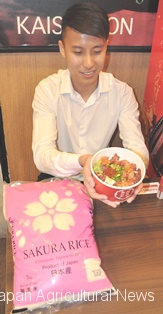
Tan, the director of YCP Dining Singapore, with his sashimi-topped rice bowl for Teppei Shokudo and Sakura Rice
TOKYO, Dec. 12 – ZEN-NOH International Corporation has started to export “Sakura Rice,” a rinse-free rice brand created exclusively for food business operators. On the back of the growing popularity of Japanese food in the world, the subsidiary of the National Federation of Agricultural Cooperative Associations (ZEN-NOH) aims at exploring new opportunities in the export market with the new business-use rice brand. The primary advantages of Sakura Rice are “made in Japan” and effectiveness in cooking processes, and multiple foodservice chains in Singapore, the country with many Japanese restaurants, have already started to use Sakura Rice. So, the ZEN-NOH affiliate thinks it has a high chance of expanding the market even further.
ZEN-NOH International has been exporting Japanese rice for home use, but it developed the new brand or rice that meets the business needs. According to the company, Sakura Rice has three outstanding advantages: the superior brand value of “made in Japan,” high quality, and rinse-free readiness. Sakura Rice is made by blending several rice brands to ensure stable quality, the company explained, and it’s already available in some Southeastern Asian countries.
Teppei Syokudo, a Singaporean restaurant chain specialized in bowls of rice topped with sashimi seafood, began serving Sakura Rice in October this year. It buys one ton of Sakura Rice a month from a local subsidiary of ZEN-NOH International, ZEN-NOH International Asia Pte. Limited. According to Teppei Yamashita, the owner of the restaurant chain, “Sakura Rice has the ideal al dente texture, and it tastes good cold too.” He plans to introduce the new rice brand to other restaurant chains he owns, including the one specialized in spicy broiled eel bowls.
“Sakura Rice is already popular among both Japanese and local customers,” Shawn Tan, one of the franchiser of the Teppei Shokudo, also said. According to Tan, the director of YCP Dining Singapore, the rinse-free rice makes it easier to cook meals, and he is happy that he can now buy the rice locally as it was hard to find one in Singapore before.
A Yakiniku (Japanese BBQ) restaurant chain, Gyu-kaku, has also begun using Sakura Rice at all of its nine restaurants in Singapore.
“Finding more business clients is effective in expanding the rice export from Japan,” an official from ZEN-NOH International said. “Making good use of ZEN-NOH’s supply chain, we can also expect to sell more vegetables and fruits together with the rice,” he added, underscoring the expectation that Sakura Rice can provide a spark for the expansion of export from Japan.

